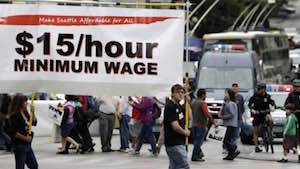When Wal-Mart Stores chief Doug McMillon announced plans to boost store workers’ minimum wage earlier this year, he said the move was intended to improve morale and retain employees.
Yet for some of the hundreds of thousands of workers getting no raise, the policy is having the opposite effect.
In interviews and in hundreds of comments on Facebook, Wal-Mart employees are calling the move unfair to senior workers who got no increase and now make the same or close to what newer, less experienced colleagues earn. New workers started making a minimum of $9 an hour in April and will get at least $10 an hour in February.
“It is pitting people against each other,” said Charmaine Givens-Thomas, a 10-year veteran who makes $12 an hour at a store near Chicago and belongs to OUR Walmart, a union-backed group that has lobbied for better working conditions. “It hurts morale when people feel like they aren’t being appreciated. I hear people every day talking about looking for other jobs and wanting to remove themselves from Wal-Mart and a job that will make them feel like that.”
Some workers also said they suspect their hours are being cut and annual raises reduced to cover the cost of the wage increase for newer workers. Wal-Mart denies that and says it’s taking steps to ensure all employees have an opportunity to move into higher-paying jobs. Along with bumping up the minimum wage, it increased the amount workers receive when promoted, boosted pay for some managers and raised the maximum pay for all hourly positions.
A broader issue
Several U.S. retailers have raised the minimum wage for their workers in recent months, among them Gap, TJX and Target. The moves were widely hailed amid calls to combat wage inequality — an issue that even reached the Securities and Exchange Commission, which on Wednesday voted to force companies to reveal the pay gap between the chief executive officer and their typical worker.
However, if Wal-Mart and other retailers don’t also adjust pay for veteran hourly workers, they could face rising dissent, said David Cooper, an economic analyst at the Economic Policy Institute. Typically, when employers boost their base pay, they also give raises to those making within $1 to $2 of the new minimum to preserve a type of wage hierarchy and keep their longer-time workers happy, studies show.
“Companies want to preserve some type of internal wage ladder, so to do that they have to adjust wages of folks above the new minimum,” Cooper said. If Wal-Mart doesn’t raise wages for these workers, “folks are going to leave or start complaining more vocally,” he said.
Executives knew the minimum wage hike would make those left out feel disenfranchised, said Kristin Oliver, Wal-Mart’s U.S. human resources chief. Since then, the company has been hearing from upset employees and understands that the new wage policy could lead to increased turnover, she said.
In an attempt to retain workers who didn’t get a raise, Wal-Mart has changed its scheduling system to help workers get the hours they want and started a new training program for employees looking to advance within the company. Wal-Mart announced the scheduling changes as well as a new training program at the same time as the wage increase to address the different needs of its workers, Wal-Mart spokesman Kory Lundberg said.
“We are constantly looking and evolving what the right pay should be and we were aware of the issue,” Oliver said. “We weren’t prepared to go forward with any additional increases but have continued to look at it to see if there is something else we should do for those in the middle.”
The cost of more raises
Giving additional raises to employees already making close to the new minimum wage would cost Wal-Mart about $400 million, said Jeannette Wicks-Lim, an assistant research professor at the University of Massachusetts, Amherst. She based her calculation on raises the retail industry has handed out after past increases to state and federal minimum wages. Wal-Mart declined to comment on her calculation.
Additional pay bumps could put further strain on profits, which Wal-Mart said last quarter were dragged down by the $1 billion it’s already spending on raises. Last year, the Bentonville, Arkansas-based chain generated $486 billion in annual sales and a profit of about $16 billion.
Wal-Mart has said about 500,000 of its 1.3 million U.S. employees are getting raises as part of the new pay policy and all employees will be able to benefit from the new scheduling and training programs.
“We are trying to create a situation where they have a path to higher paying positions over time,” Oliver said.
Still, that hasn’t been the takeaway for many workers.
Sal Fuentes, who makes $13 an hour operating a forklift overnights at a Wal-Mart in Duarte, California, said he expects the company to give out lower raises to him and other senior employees to compensate for the cost of raising pay for the newer employees.
“There is always some way they get the money back,” said Fuentes, who has worked at the company since 2006 and is a member of OUR Walmart. “They give you some but they are taking away something else. It has always been like that.”
While employers may think raising wages will help them compete for talent, research shows workers care more about how much a colleague is making than someone at another company.
“Workers appear to pay attention to peer wages,” said Laura Giuliano, an associate professor of economics at the University of Miami who has studied the issue. “Even a small difference can matter, and whether or not it is going to matter may well depend on whether it appears arbitrary or unfair.”
Givens-Thomas said she was happy to see her colleagues getting a raise and thinks it’s a sign Wal-Mart is moving in the right direction. Still, she said the new wage policy is bittersweet; Givens-Thomas recently moved in with her mother because she couldn’t afford her rent.
“I am impressed that they are even trying to raise the wages — I know it has been hard for them,” she said. “I would like to continue to see pay go up because it has been stagnant for so many years and people are really suffering.”










